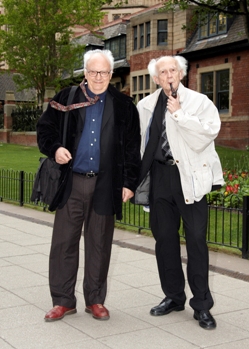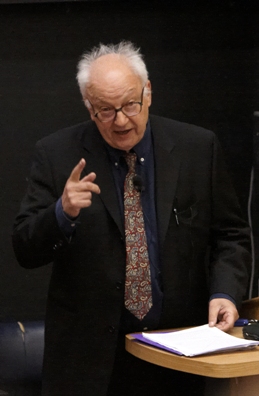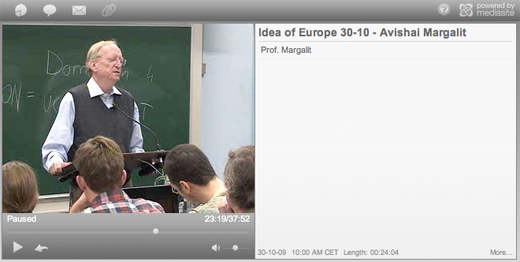
|
image copyright © Matt Kenyon |
|
Previous events
Current and recent events include:
(1) THE IDEA OF EUROPE: Occidentalism, Orientalism, and the idea of a Postcolonial Europe
(Friday 30 October, 2009
Utrecht University, the Netherlands) [more info]
(2) July 17, 2009, Primitivism and Modernity: One-day Workshop with contributions from Literary Studies, Art History, Philosophy. For details of the programme please click here.
(3) Europe and the Rest: A Dialogue between Etienne Balibar and Zygmunt Bauman (Weds. 13th May, University of Leeds) [more info]
(4) Workshop in Honour of Etienne Balibar (Thurs 14th May, University of Leeds) [more info]
(1) Idea of Europe
Occidentalism, Orientalism, and the idea of a Postcolonial Europe
Utrecht University, 30 October 2009
A highly successful workshop was held on the idea of Europe from a postcolonial perspective on October 30th at Utrecht University. The event was sponsored by the AHRC (Arts and Humanities Research Council, UK) research network 'Postcolonial Europe', and was hosted by the Centre for the Humanities in collaboration with the Institute for History and Culture and the Graduate Gender Programme, at Utrecht University, NL.
The event gathered prominent international figures in the field of European memories, postcolonial theory and philosophy such as Jewish philosopher Prof. Avishai Margalit (Princeton University, USA), postcolonial scholar Prof. Paul Gilroy (LSE, UK), cultural historian Prof. Luisa Passerini (University of Turin, It) and continental philosopher Dr. Simon Glendinning (LSE, UK) who discussed from different intellectual traditions and perspectives the idea of Europe as an imagined and actual space.
More information:
The full report of the event can be accessed here.
Video recordings of the presentations can be accessed here.
Pictures of the event can be found here.
(3) Europe and the Rest
A Dialogue between Etienne Balibar and Zygmunt Bauman Wednesday May 13 2009, 5.30-7p.m. in the Rupert Beckett Theatre, University of Leeds
Admission free and open to all
What is the current status of Europe in a globalised world, and who gets to be or call themselves 'European'? How have recent events such as 9/11 or the global financial crisis reshaped our understanding of Europe and the West, and Europe's understanding of itself in relation to the rest of the world? What do Europe's new and/or continuing internal divisions say about its own differentiated colonial histories, and is it possible for Europe to conceive of itself as a 'postcolonial' space? How is Europe situated within current North-South and East-West cultural debates? These and other questions will be addressed by two of Europe's foremost public intellectuals. Etienne Balibar (Professor of Philosophy and Political Theory at Paris X Nanterre and the University of California, Irvine) and Zygmunt Bauman (Emeritus Professor at the University of Leeds) are probably best known as worl-leading critics of Western-style capitalism and modernity. However, they have also contributed actively to ongoing public discussions about the past, present and future of Europe, and it is this work (e.g., Balibar's We, the People of Europe? and Bauman's Europe: An Unfinished Adventure), never more relevant than today, that will form the backbone of what is sure to be an exciting and provocative debate.


[TOP]
(4) Workshop in Honour of Etienne Balibar Thursday May 14 2009, 9.30a.m.-1p.m. in Seminar Room 1, LHRI, University of Leeds
Invitation-only event
This workshop, restricted to members of the network and their invited guests, notably Etienne Balibar, will look at some of the issues surrounding the notion of 'postcolonial Europe' through the lens of Balibar's work. The first discussion will focus on issues (internal divisions within Europe, the possibilities of transnational citizenship, etc.) arising from Balibar's We, the People of Europe? while the second will be organised around short presentations by members of the Munich and Utrecht groups:
SANDRA PONZANESI: 'Borders without Bodies'
Is the immigrant woman still at the borders of Europe or does she come to signify a new transnational citizenship? The immigrant woman has become the hallmark of this contested realm of representation as she comes to embody both the real, symbolic and imaginary borders that constitute Postcolonial Europe. Drawing from Balibar’s notion of the border this paper will explore the underside of cosmopolitanism by rethinking the idea of Europe from uninhabitable and unlivable positions.
PAULO DE MEDEIROS: 'Cruel Memories'
Is it possible to rethink Europe as a post-imperial polity? By referring to the work of Étienne Balibar concerning citizenship, racism, and democracy in Nous Citoyens d’Europe? (2001) and Paul Gilroy in After Empire (2004), and by taking note of a recent novel by Lobo Antunes (O Arquipélago da Insónia, 2008), this paper will focus on the related issues of cruelty, memory, and inheritance as fundamental for such a reconceptualization.
SARAH KNOR: 'Translocation as Translation: Reconstructing Dead Voices in Ondaatje's Anil's Ghost'
The paper relates Etienne Balibar's understanding of Europe as an interpreter or translator of the world to Micahel Ondaatje's novel Anil's Ghost, examining how far the concept of cultural translation can be compared to the protagonist Anil's role as a mediator between Western and Sril Lankan society. The paper also analyses to what extent the novel succeeds in representing a subaltern identity.
[TOP]



